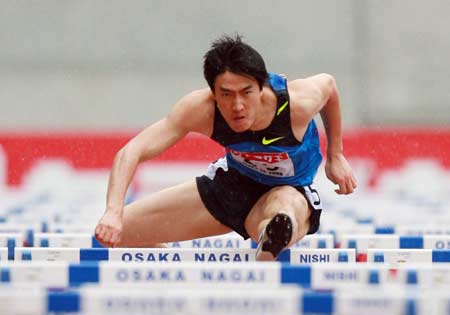
The 110 metres hurdles, or 110-meter hurdles, is a hurdling track and field event for men. It is included in the athletics programme at the Summer Olympic Games. The female counterpart is the 100 metres hurdles. As part of a racing event, ten hurdles of 1.067 metres (3.5 ft or 42 inches) in height are evenly spaced along a straight course of 110 metres. They are positioned so that they will fall over if bumped into by the runner. Fallen hurdles do not carry a fixed time penalty for the runners, but they have a significant pull-over weight which slows down the run. Like the 100 metres sprint, the 110 metres hurdles begins in the starting blocks.
For the 110 m hurdles, the first hurdle is placed after a run-up of 13.72 metres (45 ft) from the starting line. The next nine hurdles are set at a distance of 9.14 metres (30 ft) from each other, and the home stretch from the last hurdle to the finish line is 14.02 metres (46 ft) long.
The Olympic Games have included the 110 metre hurdles in their program since 1896. The equivalent hurdles race for women was run over a course of 80 metres from 1932 to 1968. Starting with the 1972 Summer Olympics, the women's race was set at 100 metres. In the early 20th century, the race was often contested as 120 yard hurdles.
The fastest 110 metre hurdlers run the distance in around 13 seconds. Aries Merritt of the United States holds the current world record of 12.80 seconds, set at the Memorial Van Damme meet on 7 September 2012 in Belgium.
